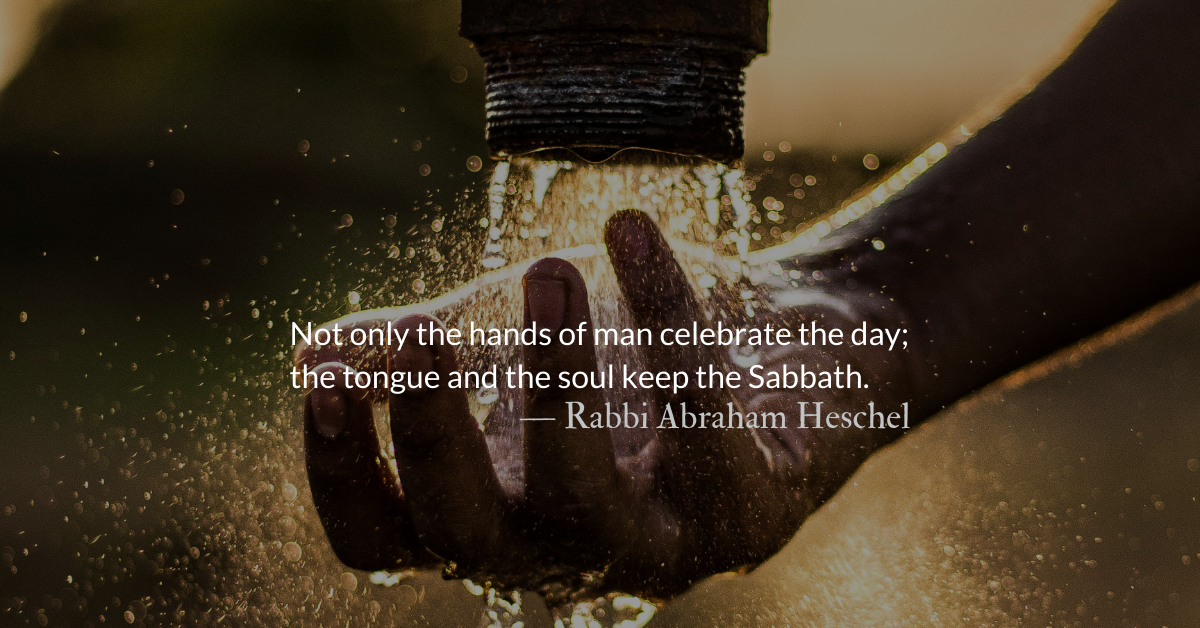Scripture Focus: Leviticus 23.3
3 “ ‘There are six days when you may work, but the seventh day is a day of sabbath rest, a day of sacred assembly. You are not to do any work; wherever you live, it is a sabbath to the Lord.
From John: Later this week, we will look at the expanded Sabbath applied to years and how it applies to the concept of Jubilee. Today we look back at Rabbi Heschel’s perspective on the weekly Sabbath.
Reflection: A Taste of Eternity
By Rabbi Abraham Joshua Heschel (1907-1972)
It must always be remembered that the Sabbath is not an occasion for diversion or frivolity; not a day to shoot fireworks or to turn somersaults, but an opportunity to mend our tattered lives; to collect rather than to dissipate time.
He who wants to enter the holiness of the day must first lay down the profanity of clattering commerce, of being yoked to toil. He must go away from the screech of dissonant days, from the nervousness and fury of acquisitiveness and the betrayal in embezzling his own life. He must say farewell to manual work and learn to understand that the world has already been created and will survive without the help of man.
Six days a week we wrestle with the world, wringing profit from the earth; on the Sabbath we especially care for the seed of eternity planted in the soul. The world has our hands, but our soul belongs to Someone Else. Six days a week we seek to dominate the world, on the seventh day we try to dominate the self.
The Sabbath is a day for the sake of life. Man is not a beast of burden, and the Sabbath is not for the purpose of enhancing the efficiency of his work. “Last in creation, first in intention,” the Sabbath is “the end of the creation of heaven and earth.”
The Sabbath is not for the sake of the weekdays; the weekdays are for the sake of Sabbath. It is not an interlude but the climax of living.
Three acts of God denoted the seventh day: He rested, He blessed, and He hallowed the seventh day. To the prohibition of labor is, therefore, added the blessing of delight and the accent of sanctity. Not only the hands of man celebrate the day; the tongue and the soul keep the Sabbath.
Labor is a craft, but perfect rest is an art. It is the result of an accord of body, mind, and imagination. To attain a degree of excellence in art, one must accept its discipline, one must adjure slothfulness. The seventh day is a palace in time which we build. It is made of soul, of joy and reticence. In its atmosphere, a discipline is a reminder of adjacency to eternity.
Divine Hours Prayer: The Request for Presence
For the sake of your Name, lead me and guide me. — Psalm 31.3
– Divine Hours prayers from The Divine Hours: Prayers for Springtime by Phyllis Tickle
Today’s Readings
Leviticus 23 (Listen – 6:31)
Psalms 30– (Listen – 1:32)
Read more about Keeping the Sabbath by Action
Keeping the Sabbath holy, maintaining God’s justice, and establishing righteousness are not passive, actionless, states of spiritual attainment.
Read more about A Restoring Sabbath
Weekly sabbaths teach us that the sabbath doesn’t condemn the week of work, but it blesses it and redeems it.






